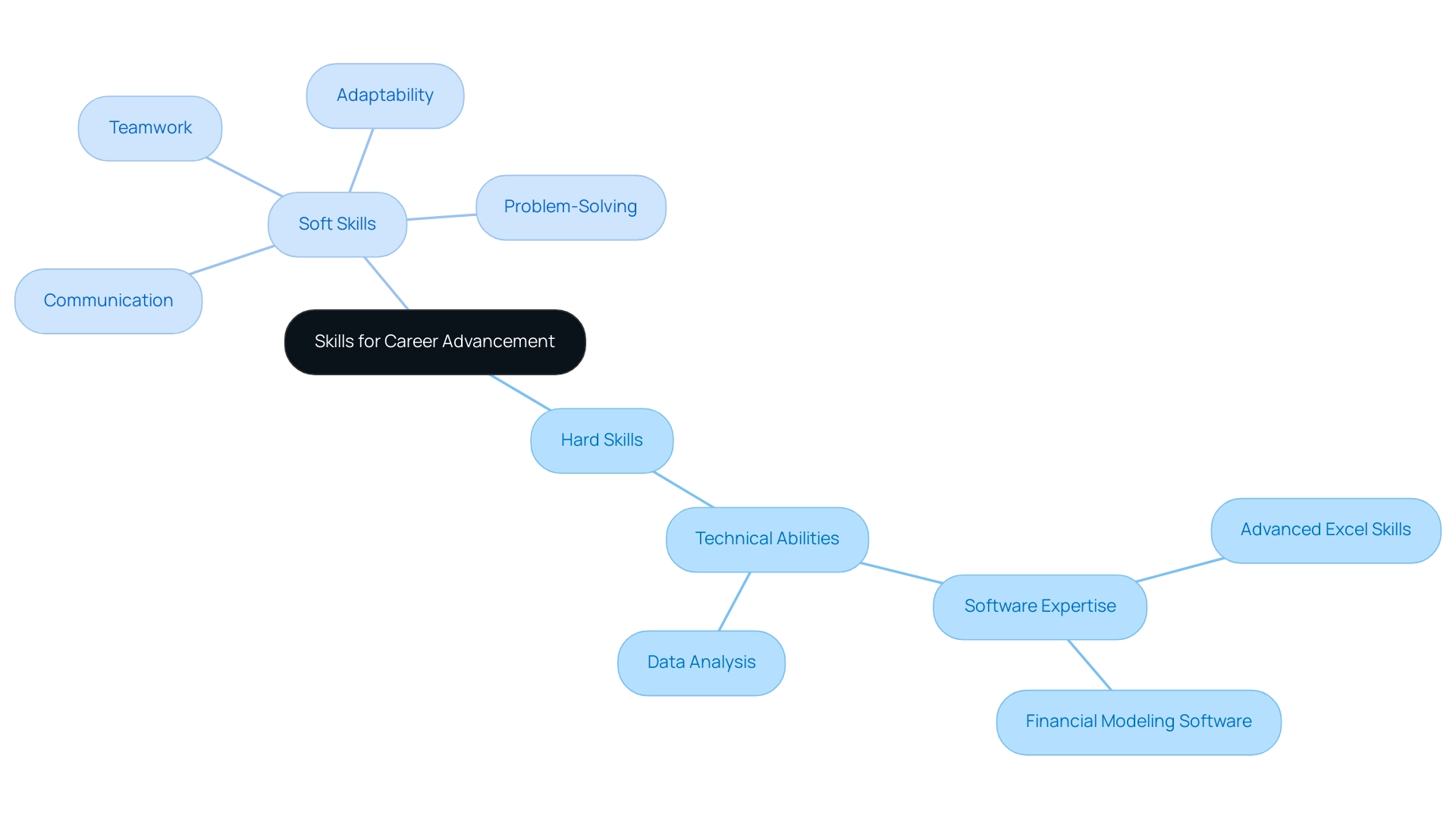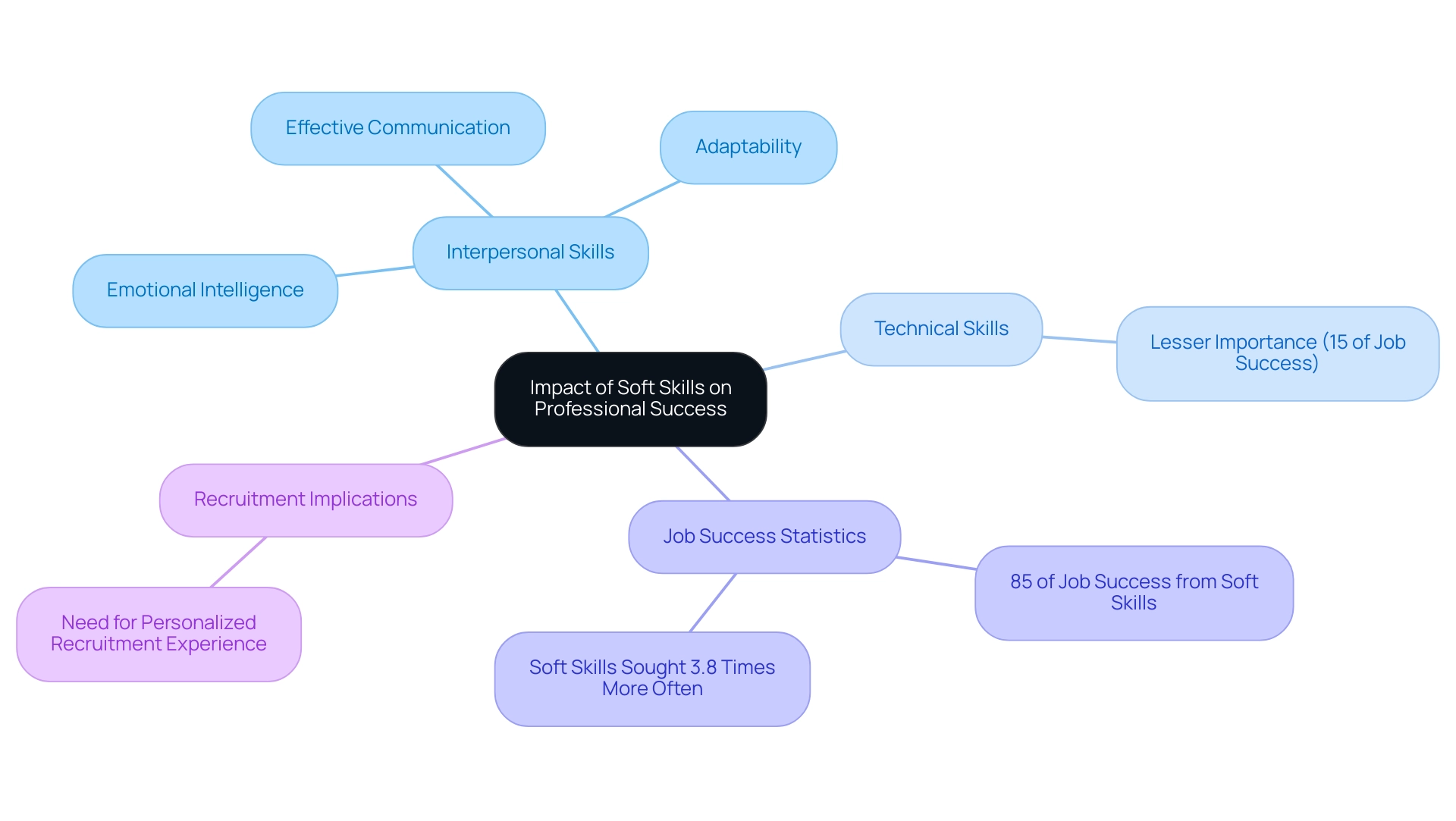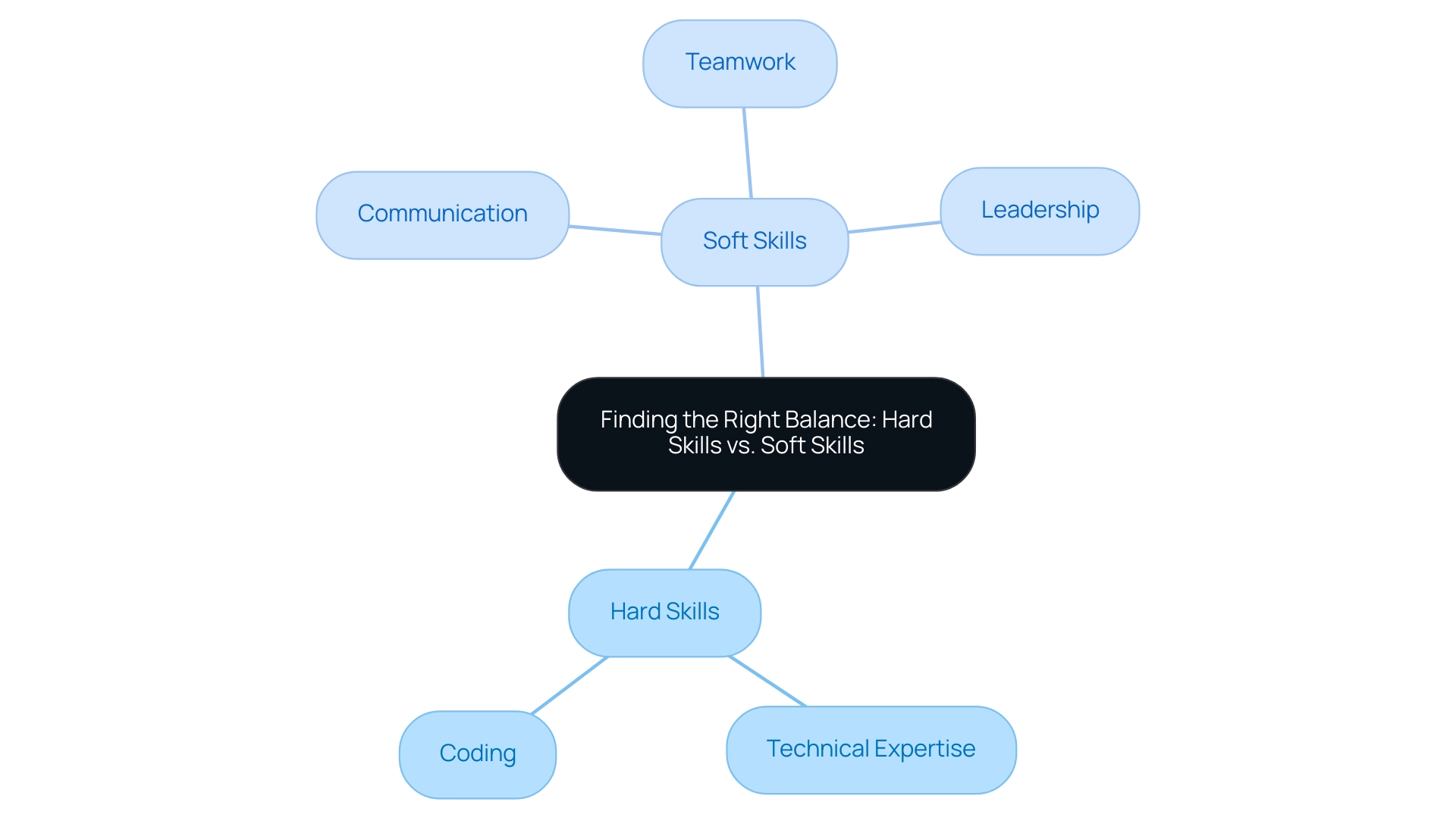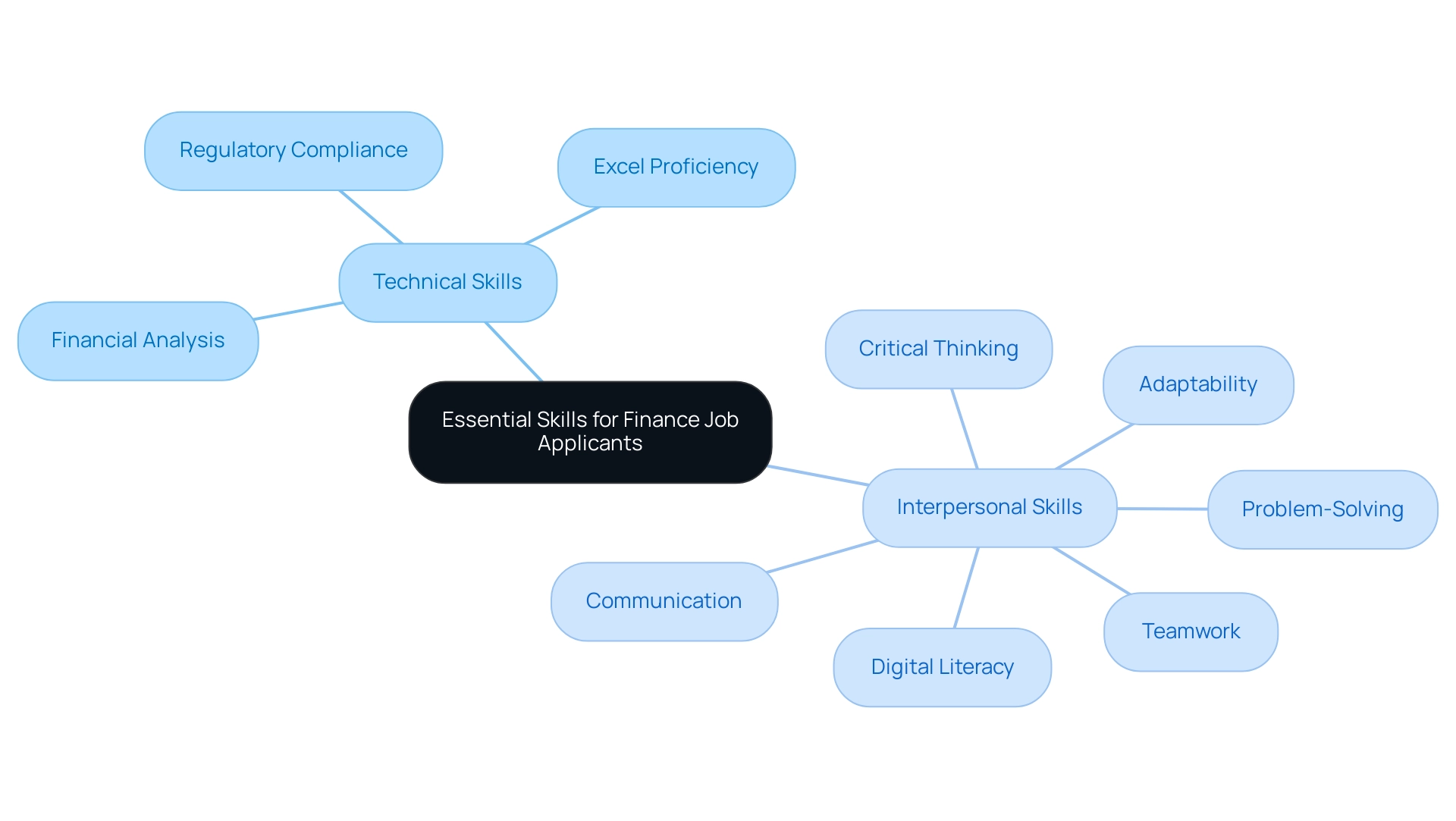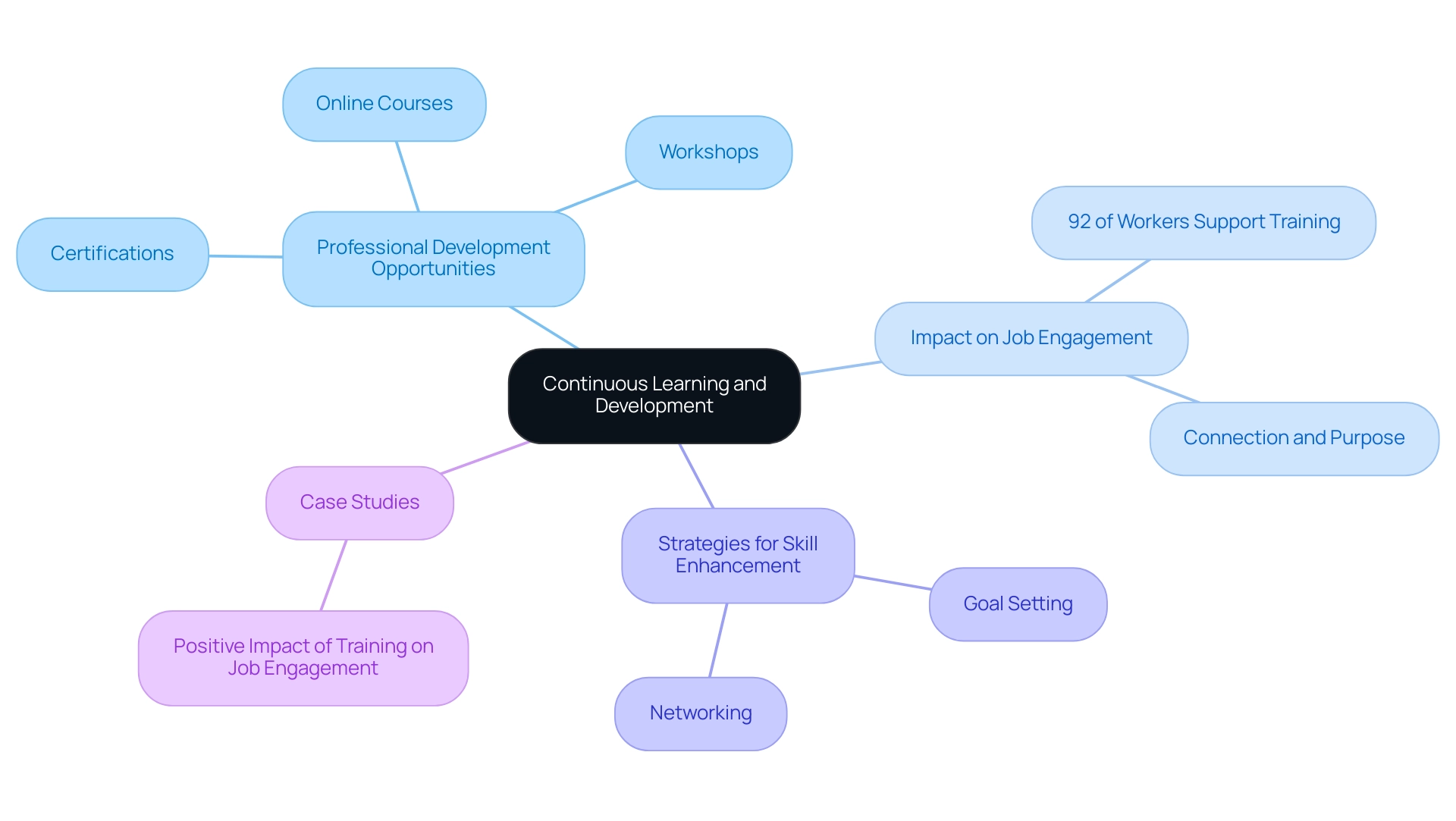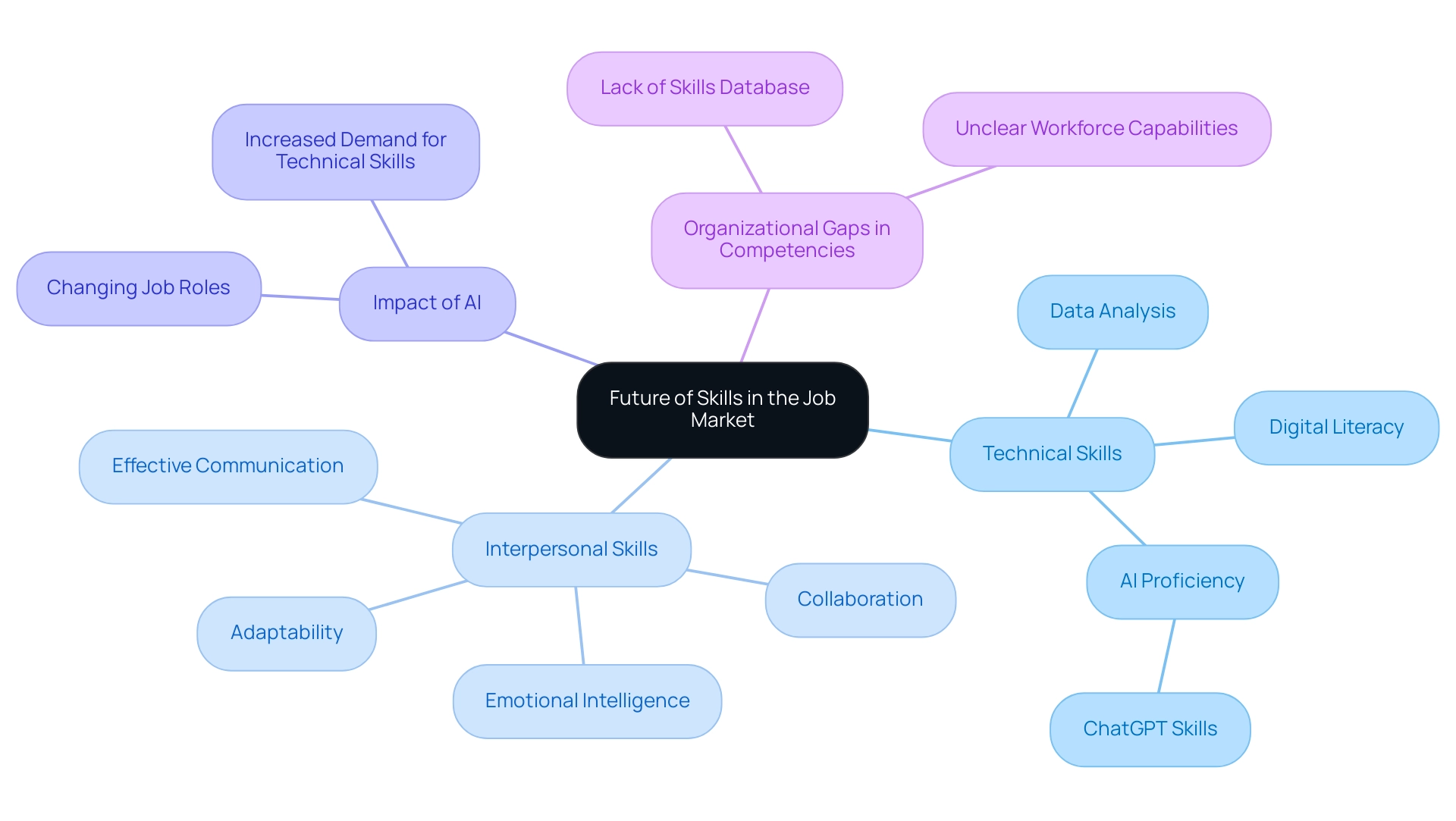Overview
The article emphasizes the critical importance of both hard skills and soft skills in resumes, asserting that employers increasingly prioritize a balance between technical competencies and interpersonal qualities. Notably, roles requiring strong interpersonal skills are projected to experience significant growth. Furthermore, it is stated that 85% of job success is attributed to well-developed interpersonal abilities, underscoring the necessity for candidates to effectively showcase both skill types. This highlights a key issue in the recruitment landscape: the need for candidates to adapt to evolving employer expectations.
Key Highlights:
- Hard skills are measurable, technical abilities essential for job functions, such as software expertise and data analysis.
- Soft skills include interpersonal qualities like communication, teamwork, and adaptability, crucial for workplace success.
- By 2030, jobs requiring strong interpersonal skills are expected to represent two-thirds of all roles, growing 2.5 times faster than those needing primarily technical skills.
- Candidates who showcase both hard and soft skills in job interviews are more persuasive and likely to secure offers.
- Employers prioritize resumes that balance technical competencies with interpersonal skills, reflecting a holistic view of a candidate’s capabilities.
- Continuous learning and skill enhancement are vital for career development, with proactive candidates standing out in the recruitment process.
- Statistics indicate that 85% of job success is attributed to well-developed interpersonal skills, while only 15% is linked to technical knowledge.
- Candidates should customize resumes to highlight relevant skills, using specific examples to demonstrate their application in real-world scenarios.
- The job market is evolving with technological advancements, requiring adaptability and ongoing skill development to remain competitive.
Introduction
In the dynamic and ever-evolving landscape of the job market, the significance of both hard and soft skills is increasingly apparent. As technology advances and industries transform, candidates must recognize that a robust blend of measurable technical abilities and interpersonal traits is essential for achieving career success. Hard skills—such as data analysis and software proficiency—serve as the foundation for specific roles, while soft skills like communication and adaptability enhance collaboration and leadership within teams.
Statistics indicate that by 2030, occupations demanding strong soft skills will dominate the job market. Thus, understanding how to effectively showcase this dual skill set becomes crucial for job seekers aiming to distinguish themselves in a competitive environment. How can candidates balance and highlight these competencies to enhance their employability? This article delves into the significance of hard and soft skills, offering insights into strategies that empower candidates to navigate the complexities of modern recruitment processes with confidence.
Understanding Hard Skills and Soft Skills
Hard competencies refer to specific, teachable abilities or knowledge sets that can be quantified and measured. These abilities are often technical in nature, encompassing proficiencies such as software expertise, data analysis, and specialized technical competencies relevant to particular job functions. For instance, a financial analyst might require advanced Excel skills or familiarity with financial modeling software.
Conversely, interpersonal qualities include attributes that promote effective and harmonious interactions with others. Key examples of interpersonal abilities encompass communication, teamwork, adaptability, and problem-solving capabilities.
In today’s competitive job market, both technical and interpersonal abilities are essential; however, they serve distinct roles in career advancement and job performance. Statistics suggest that by 2030, roles necessitating strong interpersonal abilities are anticipated to represent two-thirds of all jobs, expanding at a pace 2.5 times quicker than those demanding primarily technical competencies. This shift underscores the increasing value employers place on individuals who can navigate complex interpersonal dynamics and contribute positively to team environments—a trend already evident in 2025.
Real-world hiring decisions often reflect this duality. For instance, during job interviews, applicants who effectively highlight a balanced range of abilities—demonstrating both technical and interpersonal strengths—tend to present a more persuasive argument for their application. Utilizing storytelling techniques to present concrete examples of past experiences can significantly enhance an applicant’s appeal.
Candidates who excel in non-verbal communication and engage in a balanced conversation are more likely to secure job offers, as they illustrate their ability to fit within the organizational culture. The case study titled “Showcasing Abilities in Job Interviews” emphasizes that candidates must prepare concrete examples and balance the conversation to effectively demonstrate their expertise.
Expert opinions further highlight the significance of these abilities. A recent survey revealed that only 26% of HR professionals felt confident in recognizing the future competencies their organizations would require due to rapid technological changes. This uncertainty accentuates the necessity for candidates to continuously enhance their abilities.
Members who refresh their competencies at least every 180 days are categorized as proactive in their career development, emphasizing the importance of regular updates.
In summary, while hard abilities provide the technical foundation necessary for specific roles, soft attributes enhance interpersonal effectiveness and adaptability, making both essential for career advancement in 2025 and beyond.
The Role of Hard Skills in Career Advancement
In the financial services sector, technical abilities are the cornerstone of hiring decisions. Skills such as financial modeling, data analysis, and proficiency in accounting software are not merely desirable; they are essential. A significant percentage of employers prioritize these competencies during the recruitment process, using them as critical filters to identify suitable candidates.
Consider this: recent data indicates that 15% of finance professionals are employed at companies with 50-100 employees, where the demand for specialized expertise is particularly pronounced.
The significance of technical abilities extends beyond initial hiring; they play a pivotal role in career advancement. Candidates who effectively highlight their technical abilities alongside their business skills on their resumes are more likely to secure promotions and new opportunities. This correlation is underscored by insights from industry leaders, including Chris Box, Global Workforce Leader at PwC UK, who states, “Closing the competency gap in the financial services industry isn’t just about meeting immediate needs; it’s about future-proofing our sector.”
By investing in upskilling and reskilling, we’re not only boosting economic output but also fostering a resilient, adaptable workforce ready to tackle the challenges of tomorrow.
Moreover, the financial services market is projected to grow significantly, from $25,848 billion in 2022 to $37,484 billion by 2027, driven by evolving customer preferences and technological advancements. This growth, with an anticipated annual rate of 7.5%, emphasizes the rising significance of practical abilities in fulfilling the needs of a dynamic industry.
Case studies reveal that firms emphasizing technical abilities in their hiring processes experience tangible benefits. Organizations that prioritize financial modeling and data analysis not only enhance their recruitment outcomes but also foster a culture of continuous improvement and adaptability. As emphasized by the Financial Services Talent Taskforce report, addressing the talent and expertise crisis is essential for the industry’s future.
As the landscape of financial services evolves, the emphasis on technical abilities will remain a critical factor in both hiring decisions and career trajectories.
At Boutique Recruiting, we recognize the importance of these essential abilities in sourcing top-notch applicants for roles such as Chief of Staff, Project Manager, and other operational positions. Our customized recruitment solutions are crafted to address the unique requirements of financial firms, ensuring that we connect them with individuals who possess the necessary expertise to thrive in this competitive environment. By concentrating on technical abilities and enhancing business skills on resumes, we not only improve recruitment results but also contribute to developing a resilient workforce prepared to face the challenges of the future.
The Impact of Soft Skills on Professional Success
In today’s competitive employment landscape, interpersonal abilities have emerged as a vital differentiator among individuals with comparable technical proficiency. Skills such as emotional intelligence, adaptability, and effective communication are not merely desirable; they are essential for fostering collaboration and leadership within teams. Employers increasingly prioritize individuals who can enhance team dynamics and contribute positively to company culture.
Consider this: an applicant who excels in problem-solving and thrives under pressure may be favored over one with superior technical skills but lacking interpersonal abilities.
As the competition for talent escalates, it is crucial for hiring managers to recognize that top candidates are not just searching for any position—they are pursuing the ideal role with the right organization. Intelligent and resourceful applicants are interviewing you as much as you are interviewing them, remaining vigilant for red flags throughout the interview process. This reality underscores the importance of a seamless and personalized recruitment experience to attract top talent—a commitment that Boutique Recruiting embodies.
Statistics reveal that well-developed interpersonal abilities account for approximately 85% of job success, while technical knowledge contributes only 15%. This stark contrast emphasizes the need for individuals to cultivate and showcase their interpersonal skills alongside their technical expertise. A recent examination of job listings unveiled a notable trend: interpersonal abilities were sought 3.8 times more frequently than technical competencies in 2021, underscoring their increasing relevance in the recruitment arena.
Industry leaders echo this sentiment, asserting that the ability to communicate effectively and work collaboratively is paramount in today’s workplace. Eric Eddy, a representative from CPA Resources Global Professionals, noted Boutique Recruiting’s “ability to provide exceptional individuals promptly and effectively,” showcasing the firm’s dedication to recognizing individuals with strong interpersonal attributes. Organizations that acknowledge the significance of interpersonal abilities in their recruitment processes are better positioned to create cohesive teams and promote organizational success.
With the demand for these competencies on the rise, applicants must strategically emphasize their business skills on their resumes to align with employer expectations and enhance their career opportunities. Boutique Recruiting’s remarkable history of achievements, marked by numerous satisfied clients and candidates, further highlights the importance of interpersonal abilities in effective hiring methodologies.
Finding the Right Balance: Hard Skills vs. Soft Skills
Finding a balance between technical and interpersonal abilities is crucial for job applicants aiming to create a lasting impact. While hard abilities—such as technical expertise—initially attract attention, it is often the soft attributes that dictate long-term success within an organization. Employers increasingly seek individuals who can effectively showcase both skill sets.
Consider a software developer who excels not only in coding but also in articulating complex technical concepts to non-technical stakeholders. Such a candidate is likely to have a competitive edge in the hiring process.
To effectively showcase business skills on a resume, applicants should emphasize their technical proficiencies alongside tangible examples of their interpersonal abilities. This could include instances of teamwork, leadership, or conflict resolution, illustrating their capacity to collaborate and communicate effectively.
Statistics underscore the growing significance of interpersonal abilities in the workforce; Deloitte predicts that by 2030, roles necessitating robust interpersonal competencies will constitute two-thirds of all positions, expanding at a pace 2.5 times quicker than those requiring primarily technical expertise. This shift highlights the necessity for applicants to possess not only technical knowledge but also to develop and demonstrate their interpersonal abilities. Boutique Recruiting, a premier talent acquisition firm specializing in personalized recruitment solutions across diverse industries, recognizes this trend and emphasizes the importance of both skill types in their recruitment process.
As individuals assess job offers, it is essential to explore all available options and ensure alignment with their career goals. The first job offer may seem appealing, but without considering other opportunities, individuals might miss out on roles that better fit their aspirations. Boutique Recruiting encourages candidates to take the time to evaluate multiple offers, as this can lead to discovering positions that not only challenge their professional growth but also align with their values and long-term objectives.
Candidates should remember that the first offer may not be the best, avoiding the trap of taking the path of least resistance, and ensuring they do not commit too quickly to an offer that may lead to regret.
As noted by Charles Riborg Mann, ‘85% of job success arises from possessing well‐developed interpersonal and communication abilities, while only 15% of job success stems from technical expertise and knowledge (hard abilities).’ This underscores the essential role that interpersonal abilities play in achieving career success. Employers today expect a well-rounded skill set and evaluate these competencies through various methods, including behavioral interviews and situational assessments.
Boutique Recruiting differentiates itself by focusing on building lasting relationships and providing personalized service, ensuring that candidates not only meet technical qualifications but also fit well within the organizational culture.
Applicants who can articulate their experiences and provide evidence of both technical and interpersonal abilities are more likely to resonate with hiring managers. Ultimately, achieving this balance on a resume is not merely about listing business skills; it is about narrating a compelling story of how those skills have been applied in real-world scenarios, thereby enhancing their appeal to potential employers. To explore how Boutique Recruiting can assist you in navigating your job search and ensuring you make well-informed career decisions, contact us today!
Top Skills Employers Look for in Resumes
In today’s competitive job market, employers are increasingly seeking a mix of technical and interpersonal business skills for resumes, particularly in the finance sector. Key technical abilities, such as financial analysis, advanced proficiency in Excel, and a solid understanding of regulatory compliance, are essential for individuals aiming to stand out. Recent surveys indicate that 91% of job postings for financial roles—including positions such as CFO, Financial Manager, and Director of Finance—underscore the necessity of these technical skills, reflecting the current demand for expertise in financial analysis and data management.
Boutique Recruiting excels in identifying individuals who possess these essential abilities, showcasing their meticulous approach to recruitment.
However, hard skills alone are not sufficient. Soft skills, such as teamwork, adaptability, and effective communication, are equally vital across all sectors. Employers prioritize individuals who demonstrate strong problem-solving abilities, critical thinking, and digital literacy. These competencies are crucial for managing the intricacies of the finance sector and working efficiently within teams.
To improve their opportunities for obtaining interviews, applicants should conduct comprehensive research on the specific abilities sought in their preferred industry. Customizing resumes to emphasize both technical skills and interpersonal abilities pertinent to the job description can significantly enhance effectiveness. For instance, highlighting achievements that illustrate these skills can provide concrete proof of an applicant’s competencies.
Additionally, case studies reveal that firms like Boutique Recruiting excel in recognizing individuals who not only possess the required technical qualifications but also align with the organizational culture. This meticulous strategy for recruitment underscores the importance of showcasing a comprehensive range of business skills on resumes, appealing to hiring managers seeking candidates who can thrive in their unique environments. As Eric Eddy from CPA Resources Global Professionals noted, Boutique Recruiting has an impressive capability to deliver exceptional individuals promptly and effectively.
In summary, a successful finance resume should effectively incorporate business skills, such as financial analysis and Excel proficiency, alongside essential interpersonal qualities. This ensures individuals present themselves as well-rounded professionals ready to meet the industry’s demands. Boutique Recruiting’s remarkable track record of success and numerous satisfied clients further solidify its reputation as a trusted partner in recruitment, making it an invaluable resource for individuals aiming to enhance their resumes.
How to Highlight Skills on Your Resume
To effectively emphasize business skills on a resume, applicants should create a dedicated section that distinctly lists both technical and interpersonal competencies relevant to the position. Utilizing bullet points enhances readability and allows for quick scanning by recruiters. Moreover, applicants must incorporate these abilities into their work experience narratives, providing specific instances of how they utilized their expertise in past positions.
For instance, instead of merely stating ‘excellent communication abilities,’ an applicant could articulate, ‘led a team of five in a project that enhanced client communication, resulting in a 20% increase in customer satisfaction.’ This method not only highlights the abilities but also offers concrete proof of their impact.
Recent research indicates that 41% of recruiters prioritize competencies on resumes, with 91% appreciating the presence of interpersonal skills. This underscores the necessity for applicants to showcase a balanced blend of both technical and interpersonal abilities as vital business skills for their resumes. Additionally, a case study on resume trends for recent graduates reveals that employers increasingly favor problem-solving abilities, work ethic, and relevant experience over GPA.
Graduates are encouraged to effectively demonstrate their business skills and experiences to align with current employer expectations, thereby enhancing their employability. This aligns with Boutique Recruiting’s strong track record of success, as they emphasize the importance of tailored resumes in connecting individuals with top employers.
Incorporating these best practices can significantly influence interview success. Candidates who clearly express their abilities and demonstrate their application in real-world scenarios are more likely to stand out in a competitive job market. Expert tips suggest that applicants should tailor their business skills on resumes to match the job description, ensuring that the most relevant skills are prominently featured.
As Eric Eddy observes, Boutique Recruiting possesses the capacity to provide top-notch applicants quickly and efficiently, highlighting the effectiveness of a well-crafted resume. By adopting these strategies, individuals can create compelling resumes that resonate with employers and increase their chances of securing interviews. Moreover, with 53% of job seekers being the stars of their own video resumes, applicants can distinguish themselves by showcasing their abilities in creative formats.
Enhancing Your Skills: Continuous Learning and Development
In the rapidly evolving employment landscape, ongoing education has become essential for individuals aiming to sustain and enhance their skills. Engaging in professional development opportunities—such as online courses, workshops, and certifications—can significantly bolster an applicant’s business skills for their resume. Notably, recent findings reveal that 92% of workers believe workplace training positively influences their job engagement, underscoring the critical role of effective training programs in elevating employee satisfaction and performance.
Moreover, LinkedIn’s Workplace Learning Report emphasizes that learning fosters employees’ sense of connection and purpose, especially among Gen Z workers who prioritize learning for career advancement. Candidates should proactively seek relevant learning experiences that align with their career aspirations. This pursuit encompasses not only technical skills but also business competencies, which are increasingly valued by employers. Networking with industry professionals and engaging in forums can yield valuable insights into emerging skills and trends, further enriching an individual’s knowledge base.
Setting personal development goals is another effective strategy. For instance, acquiring proficiency in a new software program or enhancing public speaking skills can render individuals more competitive and adaptable. As Eric Eddy noted, the ability to provide exceptional prospects swiftly and effectively is a hallmark of successful recruitment.
Individuals who invest in their professional development are more likely to distinguish themselves in the recruitment process by showcasing their business skills on their resumes. Furthermore, the latest online courses and certifications are tailored to meet the demands of the current job market, making them an indispensable asset for enhancement. Key focuses for training should include fostering a diverse workforce, enhancing engagement, and cultivating a growth mindset. Emphasizing a growth mindset and a commitment to lifelong learning not only prepares candidates for immediate job opportunities but also positions them for long-term career advancement.
For example, a recent case study illustrated a professional who successfully transitioned into a new role after completing a series of targeted online courses, showcasing the practical application of continuous learning in career development. As the workforce continues to evolve, the significance of continuous learning for career progression remains paramount.
The Future of Skills in the Job Market
The job market is undergoing a significant transformation, propelled by the rapid advancement of technologies such as artificial intelligence and automation. As these innovations reshape industries, the demand for both technical and interpersonal abilities is evolving. Candidates must cultivate adaptability and a willingness to learn new competencies to maintain their relevance in this dynamic environment.
In 2025, competencies related to data analysis and digital literacy are anticipated to become increasingly essential, reflecting the growing reliance on technology across sectors. Simultaneously, interpersonal abilities such as emotional intelligence and adaptability will be crucial for effectively managing the complexities of contemporary workplaces. The ability to collaborate and communicate effectively will distinguish candidates in a competitive job market, especially as top talent now evaluates potential employers just as rigorously as they are being evaluated.
Statistics reveal that only 18% of organizations have established an employee competencies database, highlighting a significant gap in understanding workforce capabilities. This lack of clarity is further underscored by the fact that 30% of companies recognize that while their employees possess necessary abilities, there is a lack of clarity regarding these competencies. This underscores the importance of ongoing talent development and remaining aware of industry trends, particularly for recruitment firms like Boutique Recruiting, which prides itself on grasping the changing requirements of both candidates and employers.
The rise of AI is especially noteworthy, as it alters job roles and the competencies required by employers. For instance, job postings increasingly indicate a need for AI-related expertise, such as proficiency with tools like Chat GPT, particularly in sectors vulnerable to automation. Companies are adapting to these emerging requirements by prioritizing technical expertise and fostering a culture of continuous learning among their employees.
The case study titled ‘Impact of AI and Automation on Job Roles’ illustrates this trend, demonstrating how AI tools are enhancing efficiency and altering the abilities needed across various industries.
As Ryan Roslansky, CEO of LinkedIn, aptly stated, “I believe we are in the early days of a world of work that is more human than before, giving us the chance to do more fulfilling work and to do that work more easily and effectively with others.” This perspective emphasizes the importance of balancing technical knowledge with interpersonal abilities, ensuring that individuals are well-rounded and prepared for the future of work.
In summary, staying ahead in the job market necessitates a proactive approach to skill acquisition, emphasizing business skills for resume enhancement along with both hard and soft skills that align with the evolving demands of employers. Additionally, organizations must ensure that their recruitment processes are seamless and personalized to attract the best individuals, as the war for talent intensifies. Hiring managers play a crucial role in this process, as candidates are not only seeking the right job but also assessing potential employers for red flags during interviews.
Conclusion
The evolving job market underscores the critical importance of both hard and soft skills for career success. As industries adapt to technological advancements, hard skills such as technical expertise remain foundational for specific roles, particularly in sectors like finance. However, soft skills—ranging from communication to adaptability—are increasingly becoming the differentiators that enable professionals to thrive in collaborative environments. With statistics predicting that by 2030, two-thirds of jobs will require strong soft skills, the need for candidates to cultivate and effectively showcase this dual skill set is paramount.
Employers are now prioritizing candidates who can demonstrate a balance between technical competencies and interpersonal abilities. This trend indicates that job seekers must not only highlight their hard skills on resumes but also provide concrete examples of how their soft skills have contributed to past successes. Striking this balance is essential for standing out in a competitive landscape where hiring decisions are influenced by a candidate’s ability to fit within an organization’s culture and contribute positively to team dynamics.
As the job market continues to evolve, candidates must embrace a mindset of continuous learning and development, actively seeking opportunities to enhance both their hard and soft skills. This proactive approach not only prepares them for immediate job opportunities but also positions them for long-term career advancement. By recognizing and responding to the changing demands of employers, candidates can navigate the complexities of modern recruitment processes with confidence, ultimately securing roles that align with their aspirations and drive professional growth.
In conclusion, the evolving landscape of the job market necessitates a dual focus on hard and soft skills. Are you ready to adapt and thrive in this competitive environment? Reach out today for personalized recruitment services tailored to your career goals.
Frequently Asked Questions
What are hard competencies?
Hard competencies refer to specific, teachable abilities or knowledge sets that can be quantified and measured. They are often technical in nature and include skills such as software expertise, data analysis, and specialized technical competencies relevant to particular job functions.
Can you provide examples of hard competencies?
Examples of hard competencies include advanced Excel skills for a financial analyst or familiarity with financial modeling software.
What are interpersonal qualities?
Interpersonal qualities are attributes that promote effective and harmonious interactions with others. Key examples include communication, teamwork, adaptability, and problem-solving capabilities.
Why are both hard and interpersonal abilities important in the job market?
Both hard and interpersonal abilities are essential for career advancement and job performance. However, they serve distinct roles, with a growing emphasis on interpersonal abilities in the job market.
What is the projected trend for jobs requiring interpersonal abilities by 2030?
By 2030, roles necessitating strong interpersonal abilities are anticipated to represent two-thirds of all jobs, expanding at a pace 2.5 times quicker than those demanding primarily technical competencies.
How can candidates effectively showcase their abilities during job interviews?
Candidates should highlight a balanced range of abilities—both technical and interpersonal strengths—using storytelling techniques to present concrete examples of past experiences. Engaging in balanced conversation and demonstrating non-verbal communication skills can also enhance their appeal.
What percentage of HR professionals feel confident in recognizing future competencies needed for organizations?
Only 26% of HR professionals felt confident in recognizing the future competencies their organizations would require due to rapid technological changes.
How often should candidates refresh their competencies?
Candidates should refresh their competencies at least every 180 days to be categorized as proactive in their career development.
What role do technical abilities play in hiring decisions in the financial services sector?
Technical abilities are essential in the financial services sector, with skills like financial modeling and data analysis being critical filters for employers during the recruitment process.
What is the projected growth of the financial services market from 2022 to 2027?
The financial services market is projected to grow from $25,848 billion in 2022 to $37,484 billion by 2027, driven by evolving customer preferences and technological advancements.
How do organizations benefit from prioritizing technical abilities in their hiring processes?
Organizations that emphasize technical abilities not only enhance their recruitment outcomes but also foster a culture of continuous improvement and adaptability.
What is the significance of upskilling and reskilling in the workforce?
Upskilling and reskilling boost economic output and foster a resilient, adaptable workforce ready to tackle future challenges.
